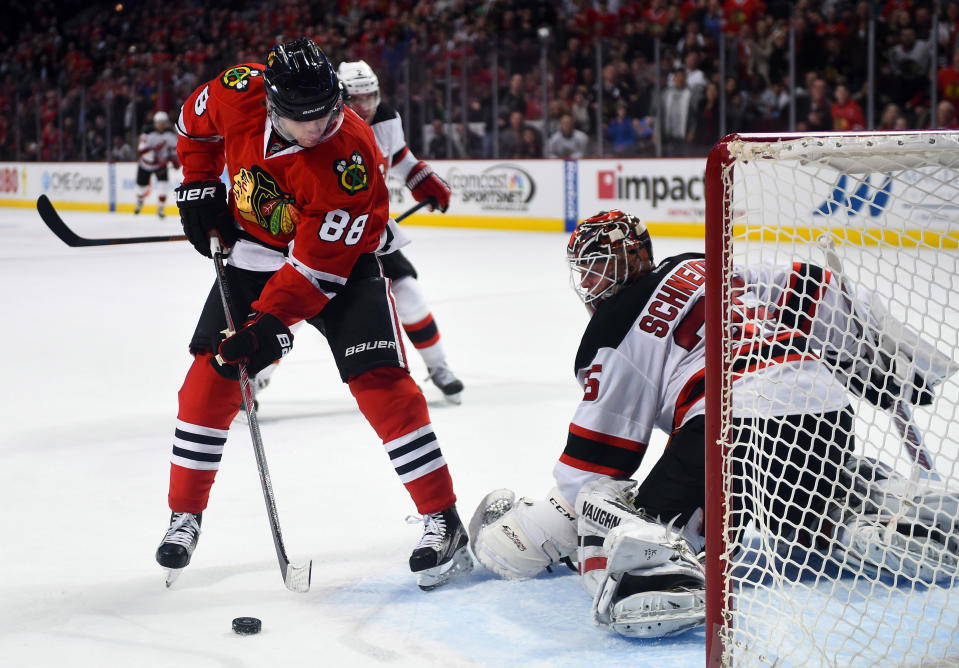Does the NHL crush the creativity of its players?

The Players’ Tribune has had a couple of terrific hockey pieces lately. On the heels of Brandon Prust’s “Why We Fight?” comes a piece on Monday from Hall of Famer Igor Larionov about the Red Army, the way they played and their influence on the NHL.
Or lack of influence, if you watch the current product: a coaches’ chess match interrupted by moments of offensive flourish.
The culprit is usually determined to be the brutal and chippy “North American style,” but Larionov says that’s not necessarily the case:
People ask me why this creative style of play is now so rare at the NHL level. The first thing that gets pointed to is the fighting and dirty play. But that’s not the heart of the problem. I’ve never been a fan of fighting, but hockey has always been a violent game. Bobby Clark [sic] purposely slashed Valeri Kharlamov and broke his ankle at the 1972 Summit Series. Those games were more brutal than anything you see today, and it didn’t stop the Soviets from playing creative hockey.
So what is the culprit? Larionov said that a conservative, paranoid streak in both coaches and players has suffocated creativity. Defense wins championships. Keep it simple, stupid. And meanwhile, all but a handful of current NHL players exhibit any semblance of offensive creativity.
From Larionov:
The problem is more philosophical and starts way before players get to the NHL. It’s easier to destroy than to create. As a coach, it’s easier to tell your players to suffocate the opposing team and not turn the puck over. There are still players whose imagination and creativity capture the Soviet spirit — Johnny Gaudreau in Calgary, Patrick Kane and Jonathan Toews in Chicago just to name a few. However, they are becoming exceptions to the rule. Many young players who are intelligent and can see the game four moves ahead are not valued. They’re told “simple, simple, simple.”
That mentality is kind of boring. Nobody wants to get fired. Nobody wants to get sent down to the minors. If you look at the coaches in Juniors and minor league hockey, many of them were not skill players. It’s a lot of former enforcers and grinders who take these coaching jobs. Naturally, they tell their players to be just like them. Their players are 17, 18 years old — younger than I was when I joined the Red Army team.
Say what you want about the Whiplash mentality (or the Soviet mentality), but if coaches are going to push kids at that age, why are they pushing them to play a simple game? Why aren’t coaches pushing them to create a masterpiece?
“Many young players who are intelligent and can see the game four moves ahead are not valued.” This is completely the case. Young players have to fit the system, fit the philosophy, do their job before ever getting the chance be an offensive game-changer.
How many offensive prospects are jettisoned to the fourth line ghetto because of a defensive lapse? How many forgo their potential for the sake of attempting to play mistake-free hockey?
More than a few, and Larionov represents one of them: Nail Yakupov of the Edmonton Oilers. His coaches have tried to round out his game for years; Larionov has argued that they're trying to turn Yak into something he's not (via the Edmonton Journal):
“I was a centre, I played the old-style, two-way game and he (Yakupov) is a goal-scorer. Look at (Pavel) Bure when he was in Vancouver. (Sergei) Makarov and ((Vladimir) Krutov didn’t play defence either (Russian national team or Central Red Army as part of the KLM line). I was doing the dirty job for them. Makarov and Krutov would be high, waiting for the pass to take off."
The equally interesting idea put forth by Larionov is that most coaches, in the NHL and down the ranks, weren’t offensive dynamos, and he’s right: The total points scored by players who end up as executives rather than coaches probably eclipses those of the men behind the bench.
Three theories on this:
1. Nepotism. It’s a copycat league that picks candidates off the coaching tree, and some successful teams are defensive in nature.
2. Temperament. Coaches are taskmasters. They’re disciplinarians. They’re screamers. They’re tough guys, sometimes physically imposing. Look at this list. There are a lot more Joel Quenneville types than top five scorers. I mean, Craig Berube, for Pete’s sake.
The other aspect of this -- for whatever reason -- is that star players tend to gravitate to player personnel roles rather than Xs and Os. Maybe it has to do with ego. Maybe it has to do with being able to spot talent rather than coach it. To that end ...
3. Great Players Can Make Bad Head Coaches. Kirk Muller was a great assistant. Adam Oates was a great assistant. Neither of them made for great head coaches. The greatest example, of course, was Wayne Gretzky, who was the quintessential star players-becomes-coach headache: a player of incredible ice vision and instinct, tasked with teaching others what came to him naturally.
Like Larionov said: It’s easier to destroy than create. That’s because you can see the steps to destruction better than the spark of creativity.
MORE FROM YAHOO HOCKEY:

 Yahoo Sports
Yahoo Sports 

